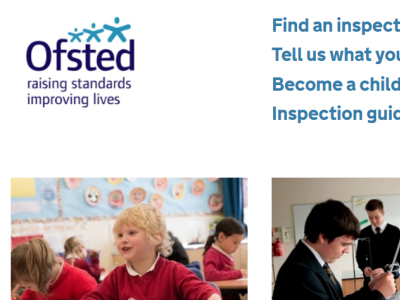
By Ray Jones, professor of social work at Kingston University and St George’s, University of London
This is the last in a series of reflections on the state of children’s social work. This week, I am exploring an issue that is significantly distracting and disrupting children’s social work within local authorities
Over recent months, I have had close contact with three Ofsted inspections. I have also spoken to many others who have had inspections in the past year. They spread across councils rated by Ofsted as ‘good’, ‘requires improvement’ and ‘ inadequate’. I don’t have views from a council rated ‘outstanding’ as Ofsted have not awarded this rating to any council.
Distribution of judgements is skewed
Indeed the distribution of judgements has become skewed, with councils previously rated as ‘good’ now being squeezed into the ‘requirements improvement’ and ‘inadequate’ end of the continuum.
Where on this scale would we rate Ofsted itself? It has been stated to me that the regulator is ‘dangerous’ and one of the greatest risks to the welfare and safety of children across England. This comment is not directed at individual inspectors and their commitment but about how Ofsted’s single inspection framework, the SIF, now operates.
The Spanish Inquisition?
Why is Ofsted seen as so destructive and damaging? Firstly, inspections are experienced as belligerent, bullying, battering and bruising. Interviews feel like an intensive intrusion and interrogation, with the intention to identify weakness and failure.
I have reflected long and hard before making the next statement, but Ofsted now feels like the Spanish Inquisition: turning up with no notice, presuming poor practice and guilt – which must be hunted down, flushed out and admitted by the inspectees.
The process has been described as ‘a living nightmare’, leaving behind ‘a seething anger’. These are quotes from two different authorities, both rated by Ofsted as ‘good’!
Blinkered focus
Secondly, the blinkered focus on children’s social services in the local authority means that little attention is given to other services working with children and families. Bizarrely, in areas where inter-agency working is well developed, with an increasing maturity, confidence and well-founded trust across services, Ofsted have sometimes criticised the authority because concerns about children are not always allocated to a social worker for a single assessment and then held on a social worker’s caseload as a child in need.
The contribution of others, and the lead role they may play in overseeing and assisting children and their families, is denied and denigrated.
Risk aversion may be an insurance for Ofsted against future criticism if some terrible unanticipated event occurs (as happened with the death of Peter Connelly in Haringey whilst rated ‘good’ in 2007).
Overloading social workers’ caseloads does not improve protection – it widens the child protection net with little benefit for children and families
Tackling CSE
Nowhere is this now truer than child sexual exploitation. After the embarrassment for Ofsted of Rotherham (rated as ‘good’ until the media and political onslaught following the concerns about networked sexual exploitation and horrific abuse), inspectors seem to take the view that unless a young person is allocated to a social worker, there is little acceptable action in place to build trust and a relationship with them, and to collect information and intelligence to protect the young person and to track networks.
I see positive developments towards creating knowledge about young people who may be vulnerable and about others who might seek to exploit this vulnerability. In some areas, multi-agency and multi-professional practice and services have been developed and embedded within communities, involving police, youth workers, schools and others, with professionals proactive and engaged with taxi companies, hotels and fast-food outlets.
Working together?
It looks impressive and inspiring to me, but to Ofsted inspectors with their restricted focus on children’s social work its value goes unrecognised. When challenged about their myopic view, one inspector is reported to have said “we are only interested in children’s social work”.
This is then reflected in inspection reports – they only have recommendations for local councils. Forty years of learning about ‘working together’ and multi-agency working in child protection has been abandoned by the national inspectorate.
Government interventions
Thirdly, Ofsted judgements feed into the Department for Education’s intervention judgements. If Ofsted rates a service as ‘inadequate’, the secretary of state will issue (in escalating order of threat): an improvement notice, an improvement direction, or a decision to remove the responsibility for children’s services from the council and from local accountability and scrutiny.
The most extreme actions to date have affected Labour controlled councils – Doncaster, Rotherham, Slough and Birmingham – but in my experience, poor political governance and leadership is not only an issue in Labour controlled councils.
Climate of threat and fear
The consequence of all of the above is that local authority children’s social services operate in a climate and culture of threat and fear. An Ofsted inspection is itself harassing. Inspection reports are front-loaded with criticisms and concerns, so that even in areas rated as ‘good’, media coverage is damning.
To be rated ‘requires improvement’ (what used to be termed ‘adequate’), is itself a demoralising judgement. And an ‘inadequate’ rating is destructive.
Confidence across all agencies is lost, thresholds become very low and triaging inoperative, the workforce implodes and becomes unstable, and there is a heavy dependence on agency workers.
Stability is lost and of knowledge of children, families, communities and partner professionals and agencies decreases. Workloads increase, become overwhelming, backlogs of assessments build up, cases are unallocated and corners are cut. It then takes at least 18 months to two years to regain stability and to rebuild confidence.
What happened to improvement and development?
It should not and does not have to be like this. It was not like this. I have held senior management and leadership roles in the sector over 25 years. I have experienced external review and inspection from the Department of Health’s Social Work Service (which became the Social Services Inspectorate – SSI; the Audit Commission and SSI major joint area reviews; the Mental Health Act Commission; the National Care Standards Inspectorate and the Commission of Social Care Inspection (CSCI). All were focused on improvement and development.
Ray Jones will be a panellist at Question Time during Community Care Live which takes place in Birmingham on 12th and 13th May. Social workers will be able to ask our panel of experts their burning questions on policy and practice.
See the full programme of expert speakers, CPD, training and best practice sessions here. The event is free to attend for registered social workers
‘Hit and run’
The SSI and CSCI, in particular, stayed close to councils to track and promote change and progress, and were recognised as having expertise and wisdom. In its annual reports CSCI was seeing and assisting improvement across councils. By Ofsted’s own judgements and annual reports, children’s social services are deteriorating with its interventions and under its watch.
There are strengths not to be lost in Ofsted’s focus on the experiences of children (and families), the child’s journey, and front line practice. But Ofsted has become a hit-and-run inspectorate – creating crashes wherever it turns up, leaving a trail of trauma and turmoil, hastening to move on, and not looking back. It doesn’t recognise the practice chaos and professional carnage it leaves in its wake.
We needs the (re-)creation of an inspectorate for children’s services which would work with other inspectorates, including Ofsted for schools and colleges, CQC for health services, and HM Inspectorate of Constabulary. It should focus on improving, enhancing and developing rather than what is experienced as rubbishing and derailing. It is time to urgently stop the damage and destruction.
Dr Ray Jones is professor of social work at Kingston University and St George’s, University of London. A social worker and former director of social services, for two days each week he oversees child protection improvement in areas rated as ‘inadequate’ by Ofsted.
You can join our Stand up for Social Work campaign by:
- Taking one action and telling us what it is
- Sharing this article
- Sharing what you’ve done to make a difference today
- Writing a letter to your MP
- Changing your profile picture
- Taking part in our survey of social worker burnout

 This article is part of Community Care’s Stand up for Social Work campaign. We’re standing up for social work by being honest, offering support and providing inspiration.
This article is part of Community Care’s Stand up for Social Work campaign. We’re standing up for social work by being honest, offering support and providing inspiration.

 Bournemouth, Christchurch and Poole
Bournemouth, Christchurch and Poole  Hampshire County Council
Hampshire County Council  Lincolnshire County Council
Lincolnshire County Council  Norfolk County Council
Norfolk County Council  Northamptonshire Children’s Trust
Northamptonshire Children’s Trust  South Gloucestershire Council
South Gloucestershire Council  Wiltshire Council
Wiltshire Council  Wokingham Borough Council
Wokingham Borough Council  Children and young people with SEND are ‘valued and prioritised’ in Wiltshire, find inspectors
Children and young people with SEND are ‘valued and prioritised’ in Wiltshire, find inspectors  How specialist refugee teams benefit young people and social workers
How specialist refugee teams benefit young people and social workers  Podcast: returning to social work after becoming a first-time parent
Podcast: returning to social work after becoming a first-time parent  Podcast: would you work for an inadequate-rated service?
Podcast: would you work for an inadequate-rated service?  Family help: one local authority’s experience of the model
Family help: one local authority’s experience of the model  Workforce Insights – showcasing a selection of the sector’s top recruiters
Workforce Insights – showcasing a selection of the sector’s top recruiters 

 Facebook
Facebook X
X LinkedIn
LinkedIn Instagram
Instagram
Comments are closed.